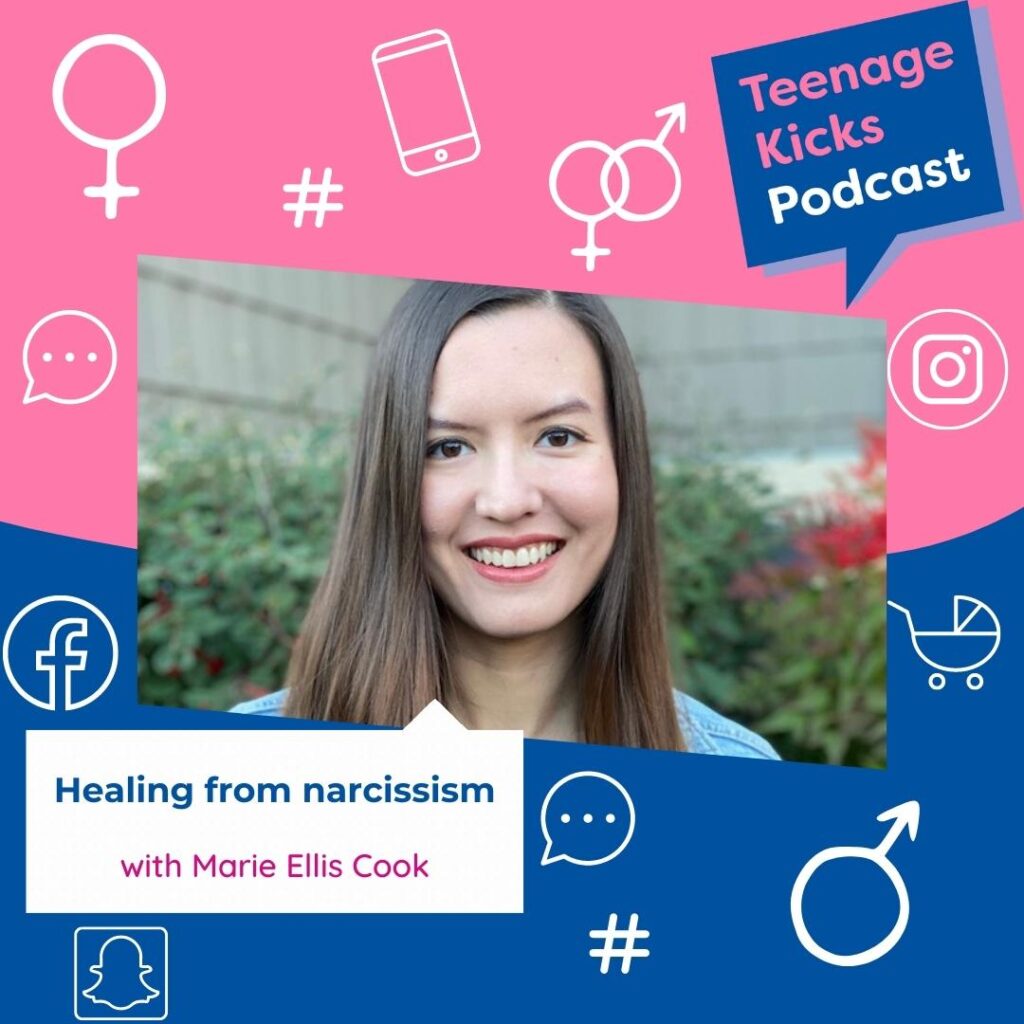The topic of narcissism in parenting is growing rapidly on social media, with more and more people talking openly about how they’ve cut ties with a parent as a result. In this podcast episode we talk about the effects of a narcissistic mother on her daughter. Marie Ellis Cook says that growing up with a narcissistic parent left her unable to accept love as an adult, and confused about her value.

What it’s like being a daughter with a narcissistic mother
Marie says that when you’re a child it can be difficult to see how a narcissistic mother destroys you. She assumed her mother’s rage and lack of comfort was normal until she visited friends and realised how other parents behave towards their children. She says she would watch movies and TV shows as a child where people were caring towards each other, and couldn’t relate to them. She thought love was a myth.
Things were especially confusing for Marie as a young child, because the persona that her mother presented in public, and in her role within their church didn’t reflect how Marie and her brother were treated at home. When she reached her teenage years she started to question why “the good mom” rarely showed up for them.
Things narcissistic mothers say
Marie tells us about a time when she talked to one of the youth leaders at church about some difficulties she was having personally; her mother was enraged, and completely negated Marie’s feelings. She screamed at Marie that she didn’t have problems, and shouldn’t be telling people outside the family that she did. Here are some of the things a narcissistic parent might say:
- That never happened
- You’re overreacting
- You’re gaining weight, you might want to watch what you eat
- You owe me for everything I do for you
- Stop crying or I’ll give you something to cry about
- You don’t care about me
- I can’t understand where I went wrong with you
- You’re useless
- Don’t talk rubbish
Marie’s mother went one step further by blaming her daughter for the distress she herself felt at the suggestion that Marie couldn’t trust her mother with her feelings. This is called parentification, where a parent offloads adult problems and feelings on their child, expecting them to take responsibility for their parent’s emotions. Marie’s mother regularly complained to her daughter about her own problems, and expected her to give comfort.
Confronting a narcissistic mother
The difference between a normal person and a narcissist is that most people will take responsibility when they’ve upset someone else; a narcissist will defend themselves and would never dream of apologising for the hurt they’ve caused. Marie says that if she confronted her mother today, she would deny any wrongdoing, defensively justifying her behaviour by saying that Marie was a difficult child.
Marie describes the process of standing up to her narcissistic mother as counter-productive. She was met with denial and defensiveness, and says that it’s usually a hopeless endeavour.
Healing from narcissistic parenting
When Marie left to go to university she struggled to know where she fit in. She was used to conforming, to getting things wrong, to knowing that she was unacceptable. She eventually realised that she suffered from codependency; she felt responsible for other people’s feelings, and didn’t know how to feel about herself in the absence of someone else’s opinion. She couldn’t believe her boyfriend when he told her he loved her, because she couldn’t see why he would.
In her early twenties, Marie confided in a friend who encouraged her to see a therapist for codependency counselling and mental health support. She made some mistakes along the way by trying to repair her relationship with her mother, but ultimately she had to remove her from her life in order to recover fully. When her son was born she realised the relationship was unsustainable and ‘broke up’ with her mum.
Listen to the podcast
View on Zencastr
Who is Marie Ellis Cook?

Marie was born and raised in Singapore and currently lives in the United States. She is the daughter of a narcissistic mother. After discovering her mother’s narcissism, she learnt to break free from narcissistic control and overcame the bonds of family enmeshment. She left the corporate world to help people from toxic families get unstuck & find their authentic selves. She is now a narcissist recovery and marriage counsellor helping others to deal with a narcissistic parent.
Subscribe to the Teenage Kicks podcast
Thank you so much for listening! I really appreciate every listener, and would love you to subscribe and leave a review wherever you get your podcasts. And don’t forget to explore previous episodes that might be of interest to you or a friend – including losing a parent, being hospitalised with mental health problems, and battling an eating disorder.
I’d love to hear from you if you have any suggestions for future topics on the Teenage Kicks podcast. Contact me here, or you can find me on Instagram and Twitter at @iamhelenwills. I appreciate every message, and love to hear from my listeners.
For information on your data privacy please visit Zencastr. Please note that I am not a medical expert, and nothing in this blog or in the podcast should be taken as medical advice. If you’re worried about a young person please seek support from a medical professional.
Join me in the Teenage Kicks Facebook group!
If you’re a parent of teens it can be difficult to know where to go for advice, to vent, or just to talk. So I’ve made the Teenage Kicks Facebook group, for all parents of teenagers to chat in a safe space. You can request to join by clicking the button below. It’s a private group and everyone in there will be a parent of teenagers.
And if you’re stuck for how to engage with your teenager, this list of things for teens to do might be helpful.

